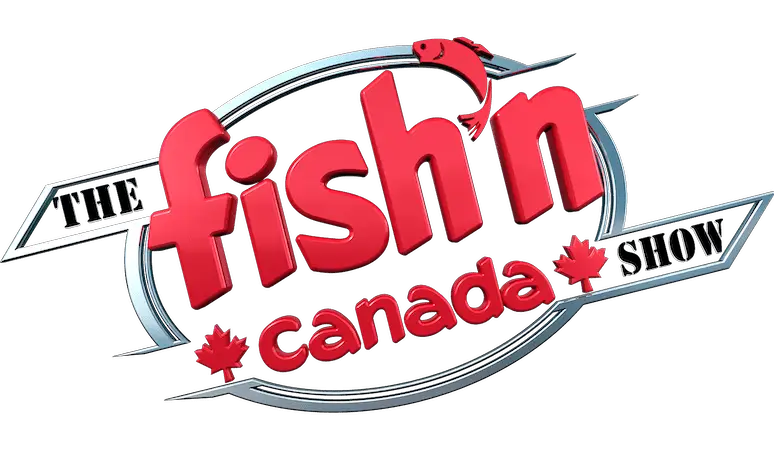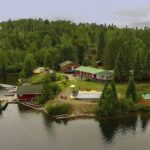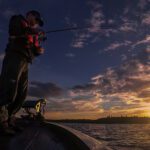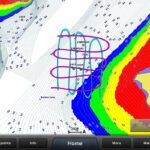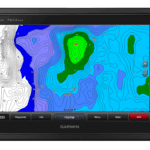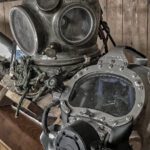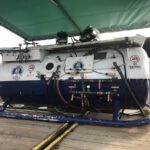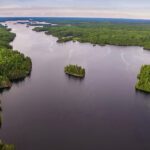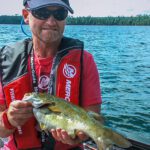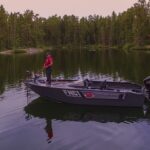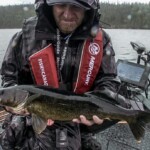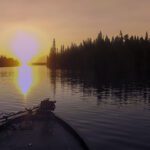Before I (Pete Bowman) had even left the office for this shoot, I knew I wanted this Fish’n Canada episode to be about learning how to fish a new lake. Obviously, I’ve never been here before. And I’m running solo—sans Angelo. One less angler in the boat can make things a little tougher to figure out.
For this trip, I was stationed at Chapleau Lodge on Borden Lake, within the arctic watershed in the Algoma region of Ontario.
There’s Walleye, Pike and Smallmouth Bass in the lake. I wanted to concentrate primarily on the Walleye. I have been known to stray away, however. I think that’s human nature to an angler.
After arriving at the lodge and talking to the owner of the establishment, and some of the customers, I concluded that my first shot at this new body of water was a spot suggested by Bob, one of the long-time lodge clients. He said this area is full of depth changes, none of which are charted on any bathymetric maps. That sounded very interesting to me, as I love running my charts and sonars trying to figure out the lay of the land.
SCOUTING
When fishing a lake that you’ve never been on before, electronics become a very important factor. Gone are the days of looking for just a change in bottom composition for a fish or two. Modern day electronics have opened so many more doors to learning the “where and why” about fish.
Take my first spot for instance; I knew there was structure, I just had to figure it out.
After a series of passes using the QuickDraw feature, which the folks at Garmin call “mowing the grass”, my units quickly revealed an unbelievable piece of structure that looked like it was tailor-made for Walleye.
This is modern day technology that we as anglers can and should use on pretty much every outing!
DIVE SCHOOL
Of all the fishing lodges Ang and I have travelled to, Chapleau Lodge might just be the most unique. There’s more than fishing here. It’s also home to the Canadian Working Divers Institute, a highly ranked commercial diving school.
CWDI has been training qualified individuals to be certified Unrestricted Surface-Supplied Divers since 1993. Since that time, CWDI has trained well over 500 divers from 25 countries. The demand for certified divers has never been greater, which gives their graduates a prime opportunity to engage in an exciting and rewarding career. Their graduates often excel into advanced positions in the diving industry.
Think about it: Take a dive course and go fishing all at the same location!
SMALLIE TRANSITION
Borden Lake is not just a Walleye Lake. It harbours a nice population of Smallmouth Bass as well. Often, during the mid-day lulls of Walleye fishing, I’ll switch gears for a change of pace. This trip was no exception.
The two smallie patterns I found were:
#1: Shallow rocks in less than six feet of water. It took a lot of casts at a lot of rocks but, eventually, I did score some aggressive Smallmouth.
#2: Main-lake islands. Again, I had to work for my fish. But remember, this lake is easy to access, so fishing will be a bit tougher than a fly-in out in the middle of nowhere.
BIG WALLEYE
The highlight of this trip was when I was back to my Walleye fishing during a torrential downpour. I was in an area where there was a fast break out from some exposed rocks. I was dragging a bottom bouncer/slow death hook with a full nightcrawler in and around the rocks as best I could. Now for those of you slow death experts, you are probably barking at me right now, saying, “You don’t use a full crawler on that rig, Bowman!” And I agree. However, it was raining, my hands were soaked AND I was undecided as to whether I should use a slow death or a live bait rig—so I combined both.
Well, I certainly can’t argue with the result. I popped a couple of gorgeous Walleye on my lazy, crazy, slow death rigmarole, including one close to five pounds. Pete’s happy now! I’m often rewarded on different moves like this.
CONCLUSION
This is an episode where I used my Garmin electronics to the utmost capacity. In the process, I learned, and will continue to learn, about how to interpret the underwater world.
The always consistent factor, though, is Ontario’s fish populations. Especially Walleye. With a lake like Borden, in the Algoma region of Ontario, you can pretty much bank on lots of fish in the water. It’s now up to you to find and then catch these delicious creatures!
OTHER ATTRACTIONS
SPECIAL THANKS
- Go Fish Ontario
- Algoma Country
- John Pegg – Chapleau Lodge
- Local Anglers: Mark Dipasquale & Travis Gauthier


